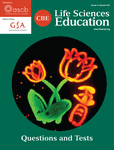Differences in Metacognitive Regulation in Introductory Biology Students: When Prompts Are Not Enough
Abstract
Strong metacognition skills are associated with learning outcomes and student performance. Metacognition includes metacognitive knowledge—our awareness of our thinking—and metacognitive regulation—how we control our thinking to facilitate learning. In this study, we targeted metacognitive regulation by guiding students through self-evaluation assignments following the first and second exams in a large introductory biology course (n = 245). We coded these assignments for evidence of three key metacognitive-regulation skills: monitoring, evaluating, and planning. We found that nearly all students were willing to take a different approach to studying but showed varying abilities to monitor, evaluate, and plan their learning strategies. Although many students were able to outline a study plan for the second exam that could effectively address issues they identified in preparing for the first exam, only half reported that they followed their plans. Our data suggest that prompting students to use metacognitive-regulation skills is effective for some students, but others need help with metacognitive knowledge to execute the learning strategies they select. Using these results, we propose a continuum of metacognitive regulation in introductory biology students. By refining this model through further study, we aim to more effectively target metacognitive development in undergraduate biology students.



